Politics
EXCLUSIVE: Pelosi reflects on long career, LGBTQ advocacy
Former Speaker credits activists who fought for AIDS funding, marriage equality
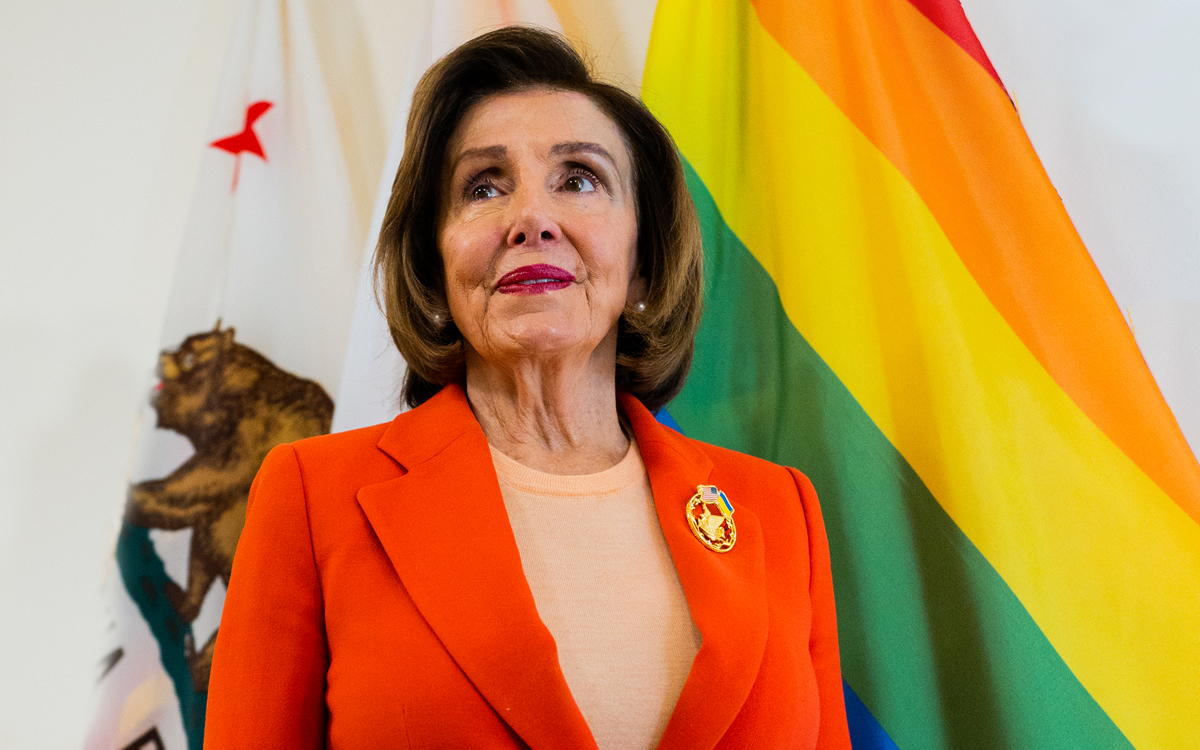
Rep. Nancy Pelosi (D-Calif.) sat down with the Washington Blade in her office Tuesday evening for an exclusive interview just weeks after formally stepping down from leadership, having led her party in the House for 20 years, including as Speaker.
Pelosi reflected on the role she has played in landmark legislative achievements, including milestones in the fight for LGBTQ rights. She also addressed some current events that have earned significant attention from political observers and the beltway press.
So much of the historic progress over the past few decades in advancements toward the legal, social, and political equality of LGBTQ Americans, including those living with HIV/AIDS, was facilitated directly or otherwise supported by Pelosi’s leadership in Congress, but she was quick to credit the tireless work of individual activists and LGBTQ, civil rights, and HIV/AIDS advocacy groups.
“I attribute the success with [fighting] HIV/AIDS and everything that came after,” from legislation on hate crimes to marriage equality, “to the outside mobilization” of these activists and organizations, she told the Blade.
Despite positioning herself as an advocate for LGBTQ rights well before that position was popular, Pelosi said she is unaware of any instances where she may have suffered political consequences as a result. Regardless, she said, “I don’t care.”
The more she has been criticized for championing LGBTQ rights in Congress, “the more proud I am” of that work, Pelosi added.
Pelosi has always been a strident LGBTQ ally, guided by her commitment to justice, love, and fairness as ordained by the teachings of her Catholic faith. These ideals are in perfect alignment, she said, as opposed to the position held by many opponents of LGBTQ rights who nevertheless claim to believe we are all created in God’s image.
During an interview with Larry King, when serving as the San Francisco Democratic National Convention host committee chairwoman in 1984, Pelosi said the late television host remarked: “I just don’t understand how a Catholic girl who grew up in Baltimore, Maryland is such a champion for gay rights.”
“You’ve answered your own question,” Pelosi told him, referring to his mention of her Catholicism. “It is our faith that tells us that we’re all God’s children, and we must respect the dignity and worth of every person.”
Pelosi’s time in Congress began with the AIDS crisis, and she has kept up the fight ever since
After committing herself and the Congress to the fight against HIV/AIDS during her first speech from the floor of the House in 1987, Pelosi said some of her colleagues asked whether she thought it wise for her feelings on the subject to be “the first thing that people know about you” as a newly elected member.
They questioned her decision not because they harbored any stigma, but rather for concern over how “others might view my service here,” Pelosi said. The battle against HIV/AIDS, she told them, “is why I came here.”
“It was every single day,” she said.
Alongside the “big money for research, treatment, and prevention” were other significant legislative accomplishments, such as “when we] were able to get Medicaid to treat HIV [patients] as Medicaid-eligible” rather than requiring them to wait until their disease had progressed to full-blown AIDS to qualify for coverage, said Pelosi, who authored the legislation.
“That was a very big deal for two reasons,” she said. First, because it saved lives by allowing low-income Americans living with HIV to begin treatment before the condition becomes life-threatening, and second, because “it was the recognition that we had this responsibility to intervene early.”
Other milestones in which Pelosi had a hand include the Housing Opportunities for People with AIDS program, President Bush’s PEPFAR (President’s Emergency Plan For AIDS Relief) initiative, the Affordable Care Act (which contains significant benefits for Americans living with HIV/AIDS), and funding for the Ending the Epidemic initiative.
The last appropriations bill passed under Pelosi’s tenure as Democratic leader in December contained an additional $100 million boost to HIV/AIDS programs.
These and other hard-won victories over the years – from the biomedical progress made possible by investment in research to foreign aid packages that have saved countless lives overseas – have often come despite staunch opposition from lawmakers, particularly congressional Republicans.
For instance, the late former Sen. Jesse Helms of North Carolina opposed federal funding for HIV/AIDS research because he considered it tantamount to the government’s endorsement of “the homosexual lifestyle” responsible for the spread of the disease in the U.S.
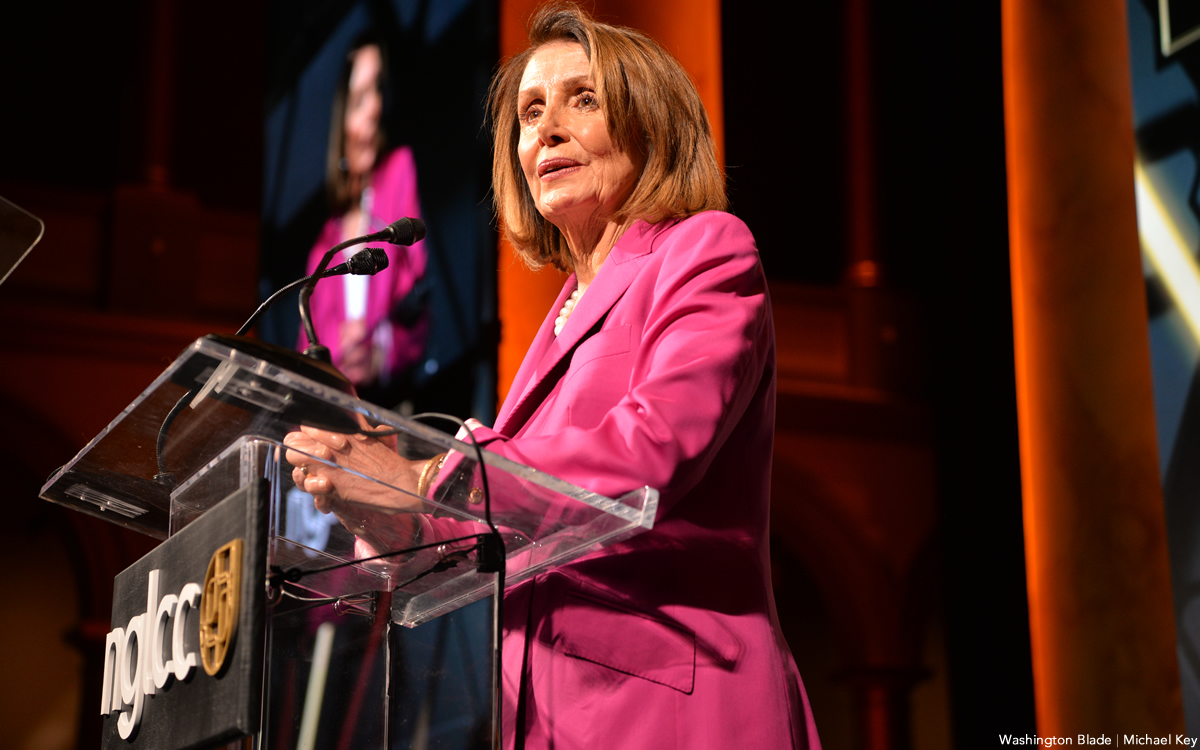
Asked how she might compare anti-LGBTQ members like Helms with whom she worked in the past to those serving today, Pelosi said the most salient difference is the homophobic and transphobic attitudes among lawmakers in previous decades were in many cases borne out of ignorance.
Pelosi said that while the prejudice was “horrible [back] then” and she was “impatient” with lawmakers in the House who exhibited attitudes similar to those expressed by Helms, at that time people who held those views were often “just not up to date on what was happening in the world.”
(Pelosi noted that, for his part, Helms seemed to soften his stance on matters concerning HIV/AIDS. She suspects U2 frontman Bono may have successfully appealed to Helms as a parent, but “I don’t know exactly.”)
By contrast, today’s lawmakers, like the overwhelming majority of Americans, “must have a growing awareness of [LGBTQ] people in their own communities, maybe in their own families,” Pelosi said. “They’re really in a different world,” which means, they “have made a decision that they’re going to be anti-LGBTQ,” she said, adding that hate and prejudice today is most often directed at the trans community. “It’s completely unacceptable.”
Asked to share her thoughts on the many scandals that have unfolded over the past couple of months concerning gay freshman GOP Rep. George Santos of New York, Pelosi pointed out that while the congressman has dominated headlines recently, other members of the House Republican caucus who have weaponized homophobia and transphobia to a far greater extent than he are much more dangerous.
But first, Pelosi said that House Democrats would never do what the Republican leadership has done by tolerating the embattled freshman congressman to protect their slim majority control of the chamber.
Santos is “almost a joke; he’s become a punch line,” Pelosi said. “He’s outrageous, and there’s no way he should be allowed to serve” given the extent to which the congressman has failed to exhibit the “dignity” required of members who are privileged to serve in the House of Representatives.
At the same time, “there are people over there who are more seriously dangerous to the freedoms in our country than him” Pelosi said. She pointed to the hate mongering and fear mongering in which many of Santos’s Republican colleagues have engaged, including “the things that that they say about trans families and, just, the injustice of it all.”

The aim of these far-right lawmakers extends far beyond undermining the rights of LGBTQ people, of course. Pelosi noted that, “you have to remember, with all of these things, whether we’re talking about women’s right to choose – we’ve always expanded freedoms. And now with this Supreme Court, they’re narrowing freedoms with women’s right to choose” by the revocation of constitutional protections for abortion via last year’s ruling in Dobbs v. Jackson Women’s Health Organization.
Breaking the ‘marble ceiling’
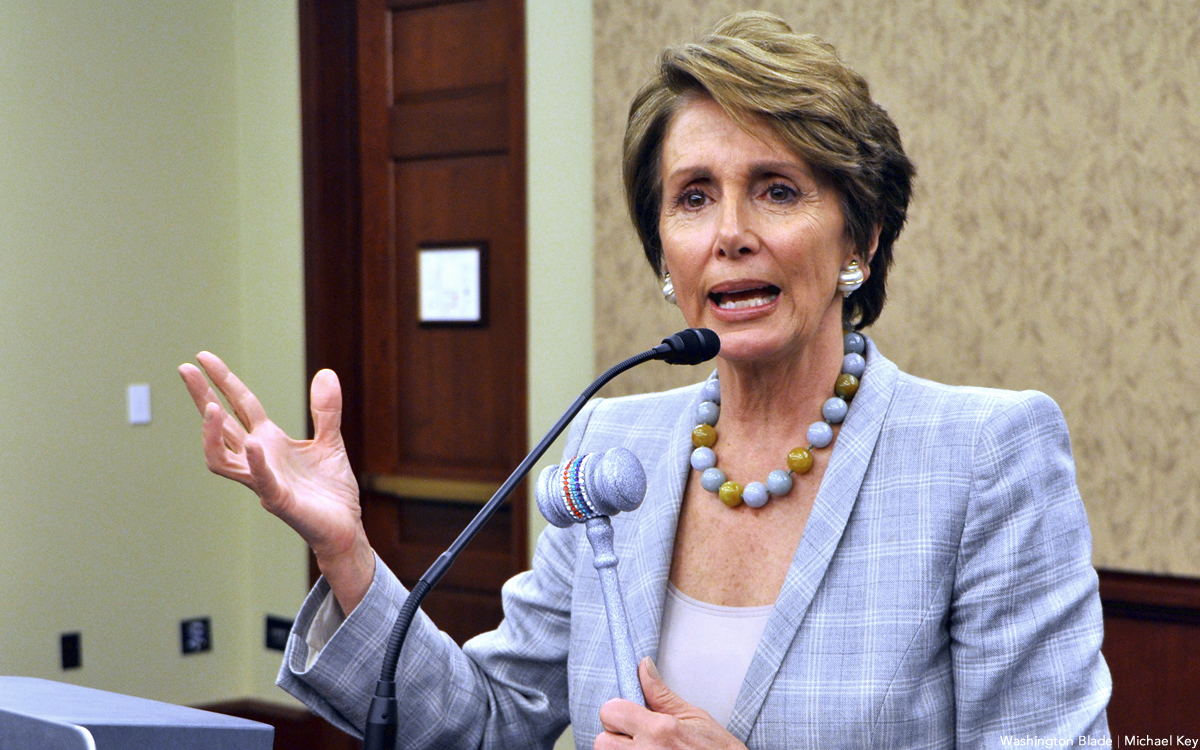
During a lecture last year hosted at the University of California, Berkeley, Barbara Boxer, who formerly represented California in the House and then in the Senate, commented on the historic significance of Pelosi’s election to become the first woman Speaker of the House of Representatives in 2006. “The fact that a woman could get into the leadership like this, to win the trust of all these men, it’s more extraordinary than you can imagine,” Boxer said.
Boxer has also been a trailblazer for women in politics. She was the first woman to chair the Marin County Board of Supervisors, and after her election to serve in the upper chamber alongside California’s senior Sen. Dianne Feinstein, the two became the first pair of women to represent any state in the U.S. Senate.
Asked how she managed to secure the votes from, particularly, the older men in her caucus without compromising her values, Pelosi told the Blade, “I just did what I believed” rather than coming to Congress to “change other people’s behavior.”
She said that many of her male colleagues “had to get over their own negative attitudes” concerning the prospect of electing a woman to lead their party in the House, but “I wasn’t going to wait until then.”
At the same time, Pelosi acknowledged that “it took courage to vote for a woman as speaker,” noting that when she was sworn in back in 2007, she took the opportunity to thank the men who had supported her speakership. (She was elected unanimously on the first ballot.)
Pelosi said that prior to her speakership, she had always believed that the prospect of Americans electing a woman president was likelier to happen in her lifetime than members of Congress – who tend to be older men – voting for a woman speaker.
“I thought the American people were more ready than the Congress” to break the “marble ceiling,” she said.
Considering the parallel special counsel investigations into alleged mishandling of classified documents by President Joe Biden and former President Donald Trump, Pelosi has perhaps unwittingly strengthened the case for America to elect a woman president by virtue of her unblemished record as a steward of sensitive, top-secret information.
“I have 30 years of experience in intelligence. I have been on the [House Intelligence] Committee, the top Democrat on the Committee, ex officio on the Committee, a speaker and [Democratic] leader [in the House],” Pelosi said.
She distinguished the rules by which she and other members of Congress are governed, which prohibit the removal or relocation of classified documents, from the policies that the Commander in Chief must follow, which are comparably more permissive.
Regardless, Pelosi said, “the documents are to be respected,” along with the rules and procedures for how they should be handled.
There are also important distinctions to note between the allegations against Trump and Biden, Pelosi said. “When you see the former president obstructing access to the documents, and you see this president saying, ‘I’ve instructed my lawyers to look for whatever is there and make them available to the Justice Department,’ that’s two different things,” she said.
Additionally, Pelosi said, from the information that has been made available so far, it seems that Trump was in possession of a greater volume of documents whose contents were more sensitive than those at issue in Biden’s case.
Pelosi’s LGBTQ fans celebrate her accomplishments
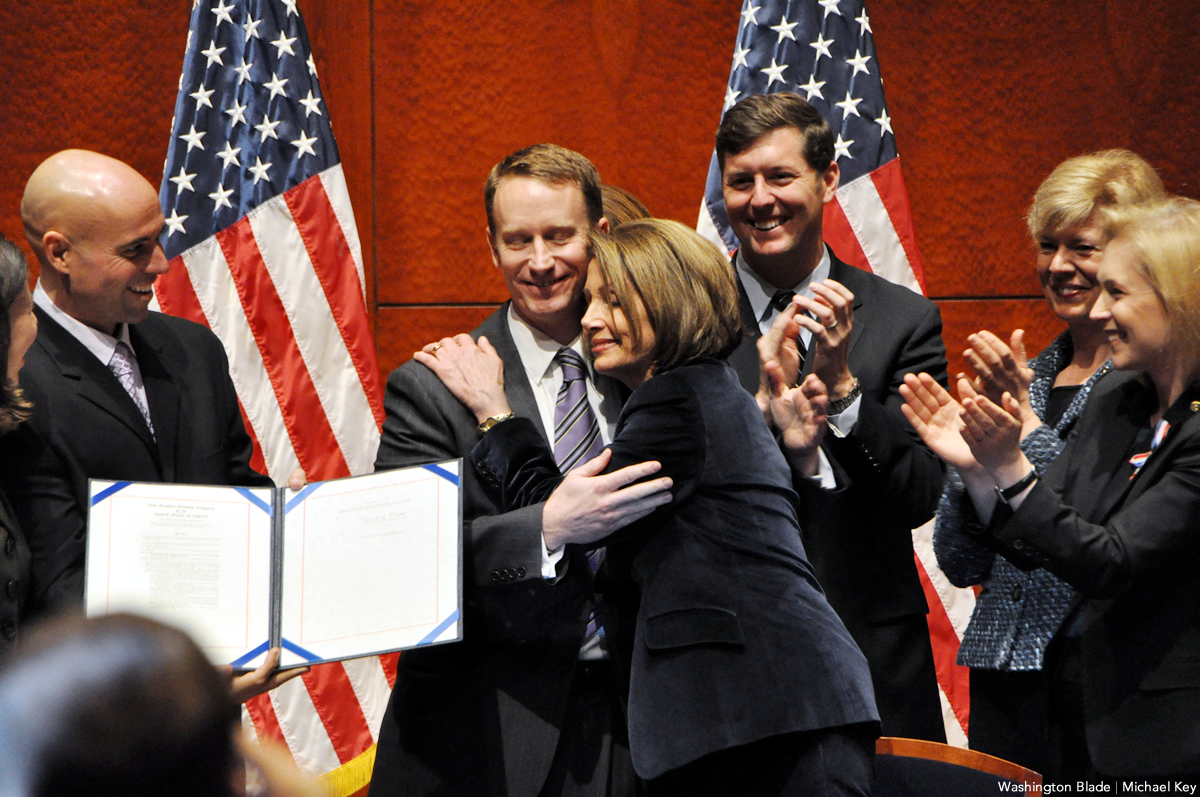
In November, the Human Rights Campaign, America’s largest LGBTQ advocacy organization, issued a statement following Pelosi’s announcement of her plans to step down from Democratic leadership but continue to represent her constituents in California’s 11th Congressional District in the House.
“Speaker Pelosi has been the tip of the spear on watershed advancements for the LGBTQ+ community,” HRC President Kelley Robinson said in a statement, pointing to her 1987 speech on the AIDS crisis and “forceful advocacy for marriage equality long before its mainstream popularity,” both before she was elected as speaker.
The Clinton-era Defense of Marriage Act, which banned federal recognition of same-sex marriages, was signed into law in 1996 with overwhelming support from both parties in both chambers of Congress; 342 members of the House voted for the proposal, with Pelosi joining only 64 other House Democrats, one independent, and one Republican in her opposition.
“During [Pelosi’s] tenure as Speaker,” HRC noted, “the House of Representatives passed an historic hate crimes law [the Matthew Shepard and James Byrd Jr. Hate Crimes Prevention Act], repealed the discriminatory ‘Don’t Ask, Don’t Tell’ law, led the fight to enact the Affordable Care Act, and vocally opposed bans on transgender members serving in our nation’s military.”
Pelosi’s leadership was bookended with Congress’s passage late last year of the Respect for Marriage Act, which is credited as the greatest legislative victory for LGBTQ Americans since the 2010 repeal of “Don’t Ask, Don’t Tell.”
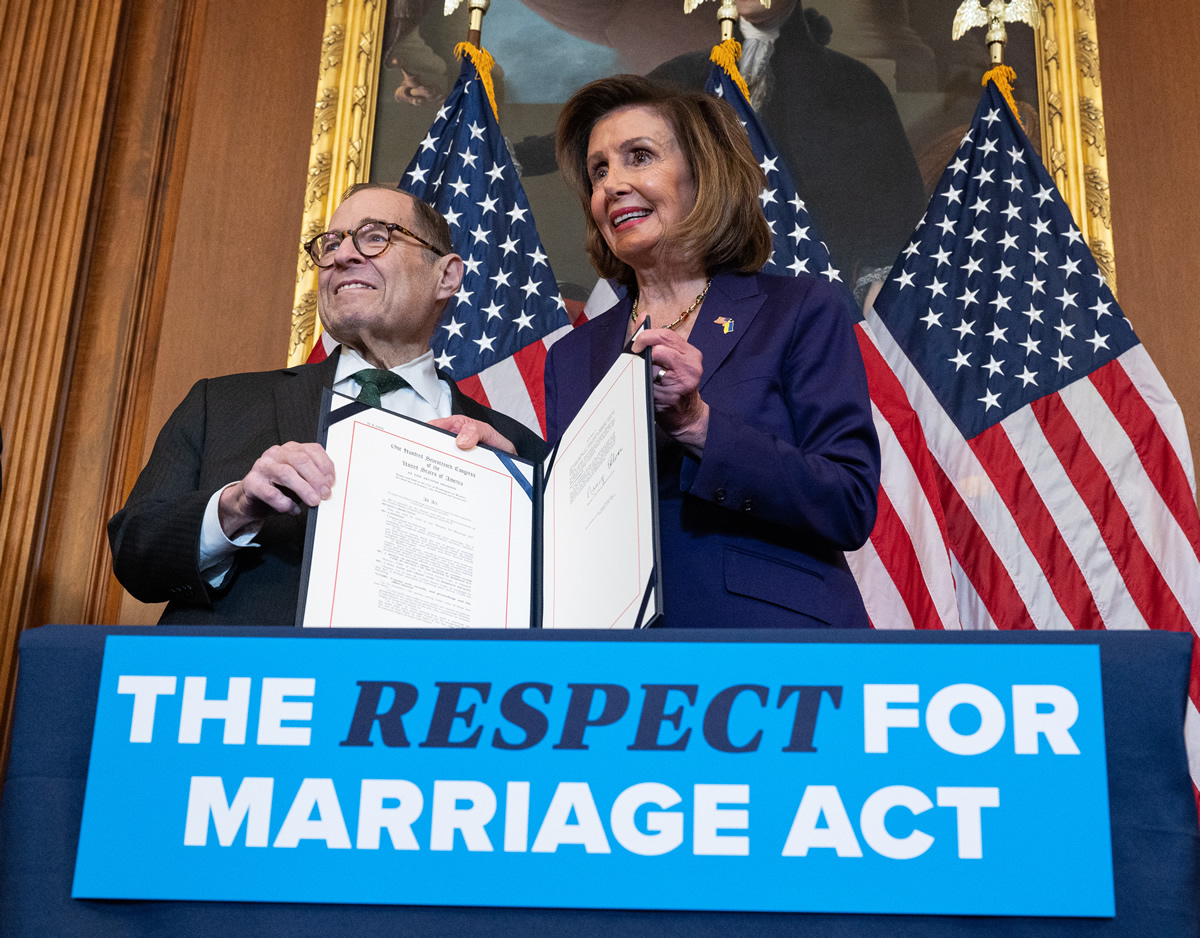
Outside the U.S. Capitol building, Pelosi has also been celebrated by the LGBTQ community for signaling her support through, for example, her participation in some of the earliest meetings of the NAMES Project AIDS Memorial Quilt, her meeting with the survivors of the 2016 Pulse nightclub massacre, and her appearance at a host of LGBTQ events over the years.
Of course, at the same time, Pelosi has been a constant target of attacks from the right, which in the past few years have become increasingly violent. During the siege of the Capitol on Jan. 6, 2021, her office was ransacked by insurrectionists who shouted violent threats against her. A couple of weeks later, unearthed social media posts by far-right Rep. Marjorie Taylor Greene (Ga.) revealed she had signaled support for executing Pelosi along with other prominent House Democrats. And last October, the speaker’s husband Paul Pelosi suffered critical injuries after he was attacked by a man wielding a hammer who had broken into the couple’s San Francisco home.
Pelosi told CNN last week that her husband is “doing OK,” but expects it will “take a little while for him to be back to normal.”
Among her fans in progressive circles, Pelosi – who has been a towering figure in American politics since the Bush administration – has become something of a cultural icon, as well. For instance, the image of her clapping after Trump’s State of the Union speech in 2019 has been emblazoned on coffee mugs.
“What is so funny about it,” Pelosi said, is rather than “that work [over] all these years as a legislator,” on matters including the “Affordable Care Act, millions of people getting health care, what we did over the years with HIV/AIDS in terms of legislation, this or that,” people instead have made much ado over her manner of clapping after Trump’s speech. And while the move was widely seen as antagonistic, Pelosi insisted, “it was not intended to be a negative thing.”
Regardless, she said, “it’s nice to have some fun about it, because you’re putting up with the criticism all the time – on issues, whether it’s about LGBTQ, or being a woman, or being from San Francisco, or whatever it is.”

Congress
Top Democrats re-introduce trans bill of rights
Lawmakers spoke outside US Capitol on Wednesday

U.S. Sen. Ed Markey (D-Mass.) and U.S. Reps. Pramila Jayapal (D-Wash.), and Sara Jacobs (D-Calif.) announced the reintroduction of a “Trans Bill of Rights” on Wednesday.
Despite chilling winds and snow on the ground, transgender activists, LGBTQ rights advocates, and trans-supporting lawmakers gathered outside the U.S. Capitol to announce the reintroduction of the “Transgender Bill of Rights” resolution to protect trans Americans, as the Trump-Vance administration continues to target LGBTQ Americans.
About 30 people gathered outside to hear from legislators and individuals impacted by recent White House policies.
“Today we say loud and clear that trans rights are human rights, and they must be protected every single day of every single year,” Markey told the crowd. “We stand together in solidarity with the trans community and with those who have too often been left behind by a system that refuses to recognize their humanity. We are here to ensure that every trans and gender-diverse person in America can live freely and safely and authentically. That’s what the Trans Bill of Rights is all about.”
Markey is leading the resolution on the Senate side, while Jayapal is pushing it forward in the House.
“With the Trans Bill of Rights, we are laying out a comprehensive vision to provide protections for transgender and nonbinary people — a vision that ensures every single person has a chance to thrive,” Jayapal said. “A vision that says: you are us, you belong, and you are worthy of the same rights as everyone else. This bill supports amending the Civil Rights Act to ensure that trans people have the same rights and protections as all other Americans. It creates a level playing field where trans people no longer have to fight tooth and nail to get the same treatment as their cisgender friends.”
The resolution for House and the Senate reads:
“Recognizing that it is the duty of the federal government to develop and implement a Transgender Bill of Rights to protect and codify the rights of transgender and nonbinary people under the law and ensure their access to medical care, shelter, safety, and economic security.”
Trans Legislation Tracker, an independent research organization that collects data on anti-trans legislation from the hyper-local level to the floor of the U.S. Senate, found that in 2025, 1,022 measures were proposed across the country to restrict the rights of trans Americans — from health care removals to bathroom bans.
Markey directly called out those lawmakers for what he described as discriminatory actions taken against trans Americans who, as he pointed out, are fighting for rights that everyone else is inherently given.
“Trump and MAGA Republicans have used the power of government to spread fear and hate across our country. They have tried to ban lifesaving and medically necessary health care, strip anti-discrimination protections, and turn trans lives into political talking points for their benefit. Well, we have a message for them: we are louder, we are stronger, and we are not going anywhere. We’re in this fight for the long term,” the Massachusetts senator said.
Jacobs, a co-chair of the Transgender Equality Task Force within the Congressional Equality Caucus, also spoke at the event.
“Trans Americans are being targeted just for being who they are — by laws and court decisions that try to erase them from classrooms, from courts and fields, from health care and public life. These attacks aren’t about safety or fairness,” Jacobs said. “They’re about hatred and instilling fear. And we know how quickly fear can warp into suspicion and violence with deadly consequences.”
In addition to lawmakers, trans Americans and supporters spoke.
Olivia Hunt from Advocates for Trans Equality, LaLa Zannell from the American Civil Liberties Union, as well as three additional people who have been actively harmed by the ongoing wave of anti-trans legislation, shared their stories.
Hunt emphasized the staggeringly high number of anti-trans bills being introduced in statehouses across the country — despite trans adults making up less than 1 percent of the population, according to the Williams Institute’s 2025 data.
“Since 2020, thousands of anti-LGBTQIA+ bills have been introduced in statehouses across the country,” Hunt said. “It’s a veritable tidal wave of political bullying disguised as legislation, and most of these bills specifically target transgender and nonbinary people — especially trans youth and their families. This is a moment that demands action.”
Hunt, who is trans, helps trans people in D.C. obtain legal documents that match their gender identity — something the Trump-Vance administration has stopped.
“Trans youth deserve to be protected by their government. They shouldn’t have to be protected from their government,” she said. “It’s long past time that our federal laws reflect and protect the reality and dignity of all people. Trans people have always existed — we are your neighbors, your family members, your community — and we belong.”
Zannell, who spoke proudly about her trans identity, explained why the bill is necessary and how it would protect trans people in all facets of their lives.
“I stand here as an unapologetic Black trans woman who has led this movement for over a decade to get us to moments like this. The reintroduction of the Trans Bill of Rights will aim to protect access to gender-affirming care, prevent discrimination in housing and public spaces, and preserve legal recognition,” Zannell said. “My hope is that this affirms our government’s duty to protect all trans and nonbinary people.”
The Transgender Bill of Rights is cosponsored in the Senate by U.S. Sens. Jeff Merkley (D-Ore.), Elizabeth Warren (D-Mass.), Mazie Hirono (D-Hawaii), Ron Wyden (D-Ore.), Martin Heinrich (D-N.M.), Alex Padilla (D-Calif.), Bernie Sanders (I-Vt.), and Peter Welch (D-Vt.).
In the U.S. House of Representatives, the resolution is led by Jayapal, co-led by Jacobs and U.S. Rep. Mark Takano (D-Calif.), with nearly 100 other representatives signing on as co-sponsors.
“To all trans people across the United States: you are seen, you are valued, and you are loved,” said Markey. “And I want you to know there are people who will fight for you every single day on the floor of the House and Senate to win those rights for you.”
2026 Midterm Elections
LGBTQ Victory Fund looks beyond Washington for change in 2026
Vice President of Political Programs Daniel Hernández spoke with Blade

As the Trump-Vance administration enters its second year, LGBTQ people from around the country are running for public office amid fears of the removal of federal civil rights laws that could lead to rollbacks in protections.
The Washington Blade sat down with Daniel Hernández Jr., the newly made vice president of political programs for the LGBTQ Victory Fund, a nonpartisan political action committee dedicated to electing openly LGBTQ individuals to all levels of government, to discuss why now is more important than ever to actualize LGBTQ political power.
Hernández is often credited with saving the life of then-U.S. Rep. Gabrielle Giffords (D-Ariz.) while working as her 20-year-old intern in Tucson, Ariz., in 2011. He served on the Pima County School Board and in the Arizona House of Representatives from 2017-2023, advocating for LGBTQ rights, healthcare access, and education.
Founded in 1991, the Victory Fund was created by a group of prominent LGBTQ political voices, including Dallas gay rights activist William Waybourn and former Human Rights Campaign Fund Executive Director Vic Basile, who were inspired by the success of EMILY’s List, a PAC that works to elect Democratic women to office.
Since its founding, the Victory Fund has worked with LGBTQ advocates and LGBTQ-supportive donors who recognized the need to prepare LGBTQ people to run for office nationwide.
When asked where LGBTQ people and allies need to focus looking ahead, Hernández emphasized that 2026 will be won or lost at the state and local level.
“One of the bigger things that people may not be paying as close attention to as we really should is the impact of state and local races. Federal races are crucial, obviously, but the folks who are actually able to have an impact in a meaningful way right now are not the people in the U.S. House or Senate,” Hernández said. “It can take years before a bill even moves through Congress. Meanwhile, state and local leaders are the ones standing up and fighting for our rights today. Especially during this Trump administration, that’s where the real action is happening.”
He expanded on that point, saying that at this moment in the U.S. political landscape, statewide races matter far more than they are often given credit for — particularly as 2026 is a midterm year under President Donald Trump. People who win elected office in midterm years, Hernández explained, are many times viewed as legislators pushing back against the administration at the top.
“Looking at 2026 in particular, because it’s a midterm year, people sometimes forget just how many critical statewide races are on the ballot. We have people like Chris Mayes in Arizona, who won by less than 300 votes in a battleground state and is now running for reelection,” he said. “These are the races that protect democracy and protect people’s rights in real time. If we ignore them, we’re doing so at our own peril. Statewide offices are where so much power actually lives.”
Hernández also urged LGBTQ voters and donors to think critically about where their time, money, and energy are going — particularly as resources remain limited heading into 2026 and not every race is winnable.
“I think one thing we don’t do enough as a community is pause and ask whether our resources are actually going where they can have an impact. If someone is running against a Republican in a plus-20 Republican state that hasn’t elected a Democrat in decades, do I really need to give my limited resources there? Or does it make more sense to support candidates in competitive states like Arizona or Wisconsin? In 2026, we have to be more strategic, because our resources are not unlimited. Winning matters.”
That calculation, Hernández said, also means moving away from what he described as emotionally driven donations and toward a more deliberate strategy.
“Our community is incredible at rallying when we’re angry, and I call that ‘rage giving.’ Someone awful is in office, a challenger pops up, and we all open our wallets. But what we really need to be doing is asking where that money will actually move the needle. In 2026, it’s not enough to feel good about donating — we have to make sure those donations help candidates who can realistically win. That’s how we protect LGBTQ rights long term.”
Asked how the Victory Fund determines which candidates receive endorsements — especially amid a growing field of openly LGBTQ contenders — Hernández emphasized that viability is central to the organization’s approach in 2026.
“One of the things we’re really focused on in 2026 is viability. We’re not endorsing people who have a zero-percent chance of winning. We’re looking at candidates who are running strong campaigns, who have plans, who are fundraising, and who are doing the work. That’s important because our community deserves guidance it can trust. When you see a Victory endorsement, it means we believe that candidate can actually win.”
Hernández also pushed back on the long-standing notion that being openly LGBTQ is a political liability — an argument that has resurfaced amid right-wing attacks on LGBTQ candidates.
“There’s been this long-standing perception that being LGBTQ is a liability and that it can cost Democrats elections. But when you actually look at the data, that just isn’t true. The reality is that being LGBTQ is not a risk — it’s often a strength. Voters care about roads, health care, affordability, and jobs, not fear-based caricatures. In 2026, we’re seeing more LGBTQ candidates than ever because people understand that now.”
That shift, he added, has helped reframe what LGBTQ candidates are actually campaigning on — despite efforts by conservatives to reduce them to culture-war issues.
“The so-called ‘gay agenda’ is not bathrooms. It’s making sure people have access to health care, that roads are safe, and that families can afford to live. LGBTQ candidates are talking about the same bread-and-butter issues as everyone else. That’s why the idea that LGBTQ candidates cost elections just doesn’t hold up. In fact, we’re seeing them lead on some of the most important issues facing voters right now.”
As misinformation and fear-based narratives continue to dominate right-wing messaging, Hernández said openly LGBTQ elected officials play a crucial role in countering those attacks — both through policy and presence.
“First and foremost, any elected official’s responsibility is to their constituents. That’s what we’re seeing from LGBTQ officials who are focused on affordability, health care access, and consumer protections while Republicans obsess over culture-war nonsense,” Hernández said. “But there’s also a responsibility to be authentic. Being honest about who you are and why you fight matters. That authenticity cuts through fear-based disinformation.”
Looking ahead to 2026, Hernández pointed to transgender elected officials as a particular source of momentum and optimism, even amid intensified political attacks.
“Our trans elected officials are honestly at the forefront of some of the biggest battles we’re facing right now. Despite relentless attacks and vilification, they are still delivering results for their communities. That tells me something incredibly powerful about where the country is headed. Even in this political climate, trans leaders are winning and governing. That gives me a lot of hope for 2026.”
Ultimately, Hernández said the stakes of the upcoming cycle extend far beyond a single election, shaping the future of LGBTQ political leadership nationwide.
“The leaders we elect at the state and local level today are the members of Congress and senators of tomorrow. People don’t just wake up one day and run for Congress — they come from city councils, state legislatures, and school boards. That’s why 2026 is so important. If we invest now, we’re not just defending our rights in the moment, we’re building the next generation of LGBTQ leadership.”
Victory Fund’s endorsed candidates
Incumbents Endorsed: January 2026
- Helen Grant (they/them) – Norman City Council, Ward 4, Okla.
- Louie Minor (he/him) – Bell County Commission, Precinct 4, Texas
- Jonathan West (he/him) – Manchester Selectboard, Vt.
- George Leach (he/him) – Court of Common Pleas, Franklin County Judge, Ohio
- John Fredrickson (he/him) – Nebraska State Senate, District 20
- Ben Bowman (he/him) – Oregon House of Representatives, District 25
- Jeffrey Prang (he/him) – Los Angeles County Assessor, Calif.
- Amie Carter (she/her) – Sonoma County Superintendent of Schools, Calif.
- Elinor Levin (she/her) – Iowa House of Representatives, District 89
- Ken Carlson (he/him) – Contra Costa County Supervisor, District 4, Calif.
- Emma Pinter (she/her) – Adams County Commission, District 3, at-large, Colo.
- Justin Chenette (he/him) – York County Commission, District 3, Maine
- Kris Fair (he/him) – Maryland House of Delegates, District 3
- Jennifer Cornell (she/her) – Ann Arbor City Council, Ward 5, Mich.
- Darlene Martinez (she/her) – Constable, El Centro – Downtown Phoenix, Ariz.
- Brian Garcia (he/him) – Arizona House of Representatives, District 8
- Christian Phelps (he/him) – Wisconsin State Assembly, District 93
- Jack Patrick Lewis (he/him) – Massachusetts House of Representatives, 7th Middlesex
- Will Brownsberger (he/him) – Massachusetts State Senate, Suffolk and Middlesex Counties
- Julian Cyr (he/him) – Massachusetts State Senate, Cape & Islands District
- CM Hall (she/they) – Newport City Council, Ore.
- Jimmy Mack (he/him) – Southampton Town Trustee, N.Y.
- Michael Vargas (he/him) – Elk Grove USD Board of Education, Area 2, Calif.
- Lisa Grafstein (she/her) – North Carolina State Senate
- Hector Bustos (he/him) – Trustee, Santa Ana Unified School District, Calif.
Newly Endorsed Candidates – January 2026
- Kirk McPike (he/him) – Virginia House of Delegates, District 5
- Winn Decker (he/him) – North Carolina House of Representatives, District 37
- Jonathan Lambert-Melton (he/him) – Wake Co. Board of Commissioners, At-Large, N.C.
- Karen Stegman (she/her) – Orange County Board of Commissioners, At-Large, N.C.
- Landon Campbell (he/him) – Hays County Criminal District Attorney, Texas
- Christine Castillo (she/her) – Bexar County District Clerk, Texas
- Nicholas “Nico” Costilla (he/him) – Hays County Clerk, Texas
- Davis Mendoza Darusman (he/him) – Harris Co. Justice of the Peace, Pct. 5, Pl. 2, Texas
- Nicholas Palmer (he/him) – Justice, Fifth Court of Appeals, Texas
- José “Che-Che” Wilson (he/him) – Cook County Board of Commissioners, District 12, Ill.
- Sarah Bury (she/her) – Metropolitan Water Reclamation District Board of Commissioners, Ill.
For more information of the LGBTQ Victory Fund’s endorsments, qualifications, or on how to register to receive an endorsement, visit the organization’s website at victoryfund.org
Congress
New Equality Caucus vice chair endorses Equality Act, federal trans bill of rights
Salinas talks about her personal road to LGBTQ advocacy

Rep. Andrea Salinas, the new vice chair of the Equality Caucus, sat down with the Blade to discuss the battles ahead as she demands protections for LGBTQ Americans.
Salinas is no stranger to government service. The daughter of a Mexican immigrant, she graduated from the University of California, Berkeley, and soon became a valued member of multiple Democratic offices — including working as a congressional aide to U.S. Sen. Harry Reid (D-Nev.) and U.S. Reps. Pete Stark (D-Calif.) and Darlene Hooley (D-Ore.). From there, she served six years in the Oregon House of Representatives before being elected to Congress, representing areas south of Salem and parts of southern Portland. With her new role in the Equality Caucus, Salinas vows to push protections for LGBTQ Americans in every room she enters.
The Washington Blade spoke with Salinas last week following her leadership announcement to discuss what the role means to her, why she — as a straight woman— feels it is her duty to fight for LGBTQ protections, and how she views the current state of the country.
When asked why she decided to take on a leadership role within the Equality Caucus, Salinas explained that she was already doing the work — but that the timing of the caucus’s outreach, coupled with what she described as a growing threat posed by the Trump-Vance administration, made the moment feel especially urgent.
“I was actually asked to take on this role because of the work I’ve already been doing. I didn’t seek out a title— the Congressional Equality Caucus came to me, and I was honored by that,” the Oregon representative told the Blade. “I’ve been a lifetime advocate, first as a mother and then as a legislator. With Trump back in office and the shackles off, kids are vulnerable right now, and they’re being attacked. We need champions, and with or without a title, I was going to do this work anyway.”
That work includes passing LGBTQ-related education policy during her time in the Oregon House of Representatives, requiring the Oregon Department of Education to train teachers on how to better support LGBTQ students. She also backed legislation aimed at preventing LGBTQ-related bullying and harassment, while using her platform to ensure educators had the skills needed to address trauma in the classroom. Salinas also pushed for Oregon’s 2013 conversion therapy ban and played a role in defending it.
Salinas said her personal motivation for expanding and protecting LGBTQ rights is rooted in the experiences of her daughter, Amelia.
“My daughter is queer, and she has known who she is since she was a child,” Salinas said. “She presents very masculine, and I’ve had to advocate for her her entire life — from whispers on soccer sidelines to fears about using the bathroom when she was just three or four years old. That kind of bullying and harassment stays with you as a parent. It became part of who I am, part of my ‘mama bear’ advocacy. When I entered public office, continuing that fight was the most natural thing in the world.”
That “mama bear” advocacy, she said, now extends far beyond her own family.
“Across this country, kids are vulnerable right now, and Trump is attacking them,” she said. “My daughter was devastated after the 2024 election— she said, ‘They’re coming after us,’ and she was right. That fear is real, especially for transgender youth. Civil rights should be expanding, not being stripped away from certain communities. That’s why this fight feels so urgent.”
Since returning to the White House in 2024, the Trump administration has moved to roll back anti-discrimination protections, particularly those affecting transgender people. These efforts include barring transgender people from serving openly in the military, blocking access to gender-affirming medical care in federal health programs, challenging state laws that protect transgender students on religious grounds, and arguing that the Constitution entitles employers to discriminate against LGBTQ people based on religious beliefs — even in states with nondiscrimination laws.
For Salinas, the Equality Caucus’s most urgent task under the Trump-Vance administration is advancing what she called a long-sought but non-negotiable priority: the Equality Act.
The Equality Act would add explicit protections based on sexual orientation and gender identity to federal law. Despite more than five decades of debate on Capitol Hill, no version of the bill has yet become law.
“We have to keep pushing the Equality Act— there’s no way around that. No one should be discriminated against in housing, employment, credit, or healthcare because of who they are,” Salinas said. “Republicans are making LGBTQ identity a political wedge because they think it’s expedient, and that’s unacceptable. Sexual orientation and gender identity should not matter in determining someone’s access to opportunity. Yet here we are, still having to fight for that basic principle.”
Salinas added that advancing legislation like the Equality Act requires compassion— even when that compassion is not returned— and a commitment to education.
“We have to meet people where they are— Democrats, Republicans, independents, all of them. Until you know a family, or understand someone’s lived experience, it can feel abstract and overwhelming,” she said. “Education, compassion, and empathy are essential to moving the dial. When people understand this is about human rights, not politics, conversations start to change. That’s how we build broader support.”
She also emphasized the need for a federal transgender bill of rights, which would provide explicit protections for transgender Americans amid what she described as an increasingly hostile federal environment.
“A transgender bill of rights would clarify that discrimination against transgender and nonbinary people is illegal — in employment, housing, credit, and healthcare,” Salinas said. “What’s happening right now, with efforts to criminalize doctors for providing evidence-based care, is unheard of and dangerous. We also need to ban conversion therapy nationwide, because states are increasingly trying to undo those protections through the courts. These safeguards are about ensuring people can live safely and with dignity. That should not be controversial.”
Mental health is another central focus of Salinas’s work. She said ensuring children have access to support— particularly LGBTQ youth— is critical to their long-term wellbeing.
After the Trump administration eliminated the LGBTQ-specific option from the 988 Suicide and Crisis Lifeline, Salinas said her reaction was one of outrage.
“When Trump shut down the 988 press-three option for LGBTQ youth, I was apoplectic,” she said. “It is one of the simplest, most upstream ways to save lives, and it felt arbitrary, cruel, and inhumane. We know the suicide risk among transgender youth is far higher than among non-LGBTQ kids. Connecting them with someone who understands their experience can be life-saving. This should be bipartisan, and I’m going to keep pushing to restore it.”
“You cannot be what you cannot see….” she added while reflecting on the handful of LGBTQ leaders who have— and continue to— navigate the halls of Congress to protect their community. “When Sarah McBride was elected, my daughter met with her and walked out glowing… joyful, hopeful, and excited about the future. That kind of representation changes lives. Electing LGBTQ leaders changes the trajectory for people across the country. Grassroots organizing and electoral power go hand in hand, and we need both.”
With Salinas’s experience in both the Oregon House of Representatives and the U.S. House of Representatives, she said that while one arena may reach more people, change often begins locally, especially when combating anti-LGBTQ attacks.
“I’ve seen how misinformation fuels fear at the local level— whether it’s school board fights or bathroom debates rooted in baseless claims. There is no data to support these scare tactics,” she said, echoing her past work with the Oregon Department of Education. “What actually helps is facts, education, and training teachers to better support LGBTQ students. I passed legislation in Oregon to give educators real tools to prevent bullying and harassment. That kind of work matters just as much as what we do in Congress.”
Despite just being named vice chair of the Equality Caucus, the Blade asked Salinas what legacy she hopes to leave, particularly when it comes to LGBTQ advocacy.
“I want people to be able to live authentically, without fear from their government or their neighbors. That means passing real legislation— the Equality Act and a transgender bill of rights— so protections are not dependent on who’s in power. Civil and human rights are meant to expand, not contract.
“I’ve been doing this work since I became a mother, and I’ll keep doing it for as long as it takes. My daughter deserves it, and so does every LGBTQ person in this country.”
-

 Federal Government5 days ago
Federal Government5 days agoTwo very different views of the State of the Union
-

 Virginia5 days ago
Virginia5 days agoVa. activists preparing campaign in support of repealing marriage amendment
-

 Opinions4 days ago
Opinions4 days agoThe global cost of Trump’s foreign aid ideology
-

 Opinions4 days ago
Opinions4 days agoCriteria for supporting a candidate in D.C.


















